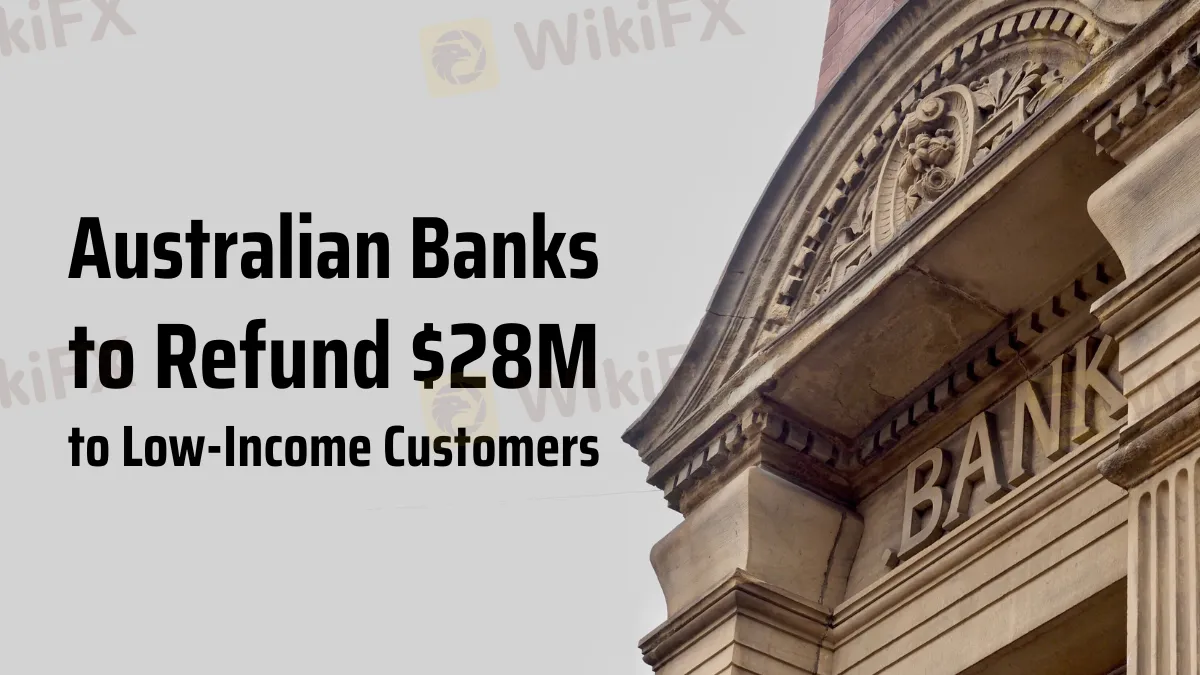简体中文
繁體中文
English
Pусский
日本語
ภาษาไทย
Tiếng Việt
Bahasa Indonesia
Español
हिन्दी
Filippiiniläinen
Français
Deutsch
Português
Türkçe
한국어
العربية
Australian Banks to Refund $28M to Low-Income Customers
Abstract:Four Australian banks will refund $28M to low-income customers, including First Nations individuals, after ASIC found many were kept in high-fee accounts.

Four central Australian banks, ANZ Bank, Bendigo and Adelaide Bank, Commonwealth Bank, and Westpac, have agreed to repay a total of $28 million to low-income clients, including First Nations people. This ruling follows an investigation by the Australian Securities and Investments Commission (ASIC), which discovered that these clients were held in high-fee bank accounts despite being eligible for lower-cost options.
The ASIC audit, issued today, revealed that more than two million consumers, many of whom receive Centrelink benefits, were paying excessive costs. Customers who receive particular government payments should be eligible for low-fee accounts, according to the banking code of practice. However, the analysis revealed that many of these low-income clients were stuck in high-fee accounts, drastically diminishing their savings.
According to Alan Kirkland, an ASIC commissioner, these hefty fees put a financial hardship on many consumers, particularly those in rural and isolated locations. These clients often struggled to manage their funds due to the banks' cumbersome procedures.
“Banks knew that many of these customers on low incomes were in inappropriate high-fee accounts,” claims Kirkland. He pointed out that prior to the study, banks only provided cumbersome “opt-in” procedures for clients to convert to low-fee choices, forcing some to drive long distances to the closest branch.
While banks had processes in place to identify consumers who were likely to be eligible for reduced-fee accounts, their attempts to convince these customers to transfer may have been more successful, with success rates as low as 0.5%.
In response to ASIC's findings, the banks have pledged to convert more than 200,000 clients to low-fee accounts, which are estimated to save them around $10.7 million annually. Over the next 12 to 18 months, banks will refund more than $28 million in fees, with $24.6 million going directly to those receiving ABSTUDY payments—a support scheme for Aboriginal or Torres Strait Islander students or apprentices—and those living in areas with significant First Nations populations.
Kirkland stressed the need of banks to do more to avoid such concerns from occurring in the future. “Banks need to ensure they have systems and processes in place, so customers on low incomes can easily transition to low-fee accounts, regardless of their location,” he told us.

Disclaimer:
The views in this article only represent the author's personal views, and do not constitute investment advice on this platform. This platform does not guarantee the accuracy, completeness and timeliness of the information in the article, and will not be liable for any loss caused by the use of or reliance on the information in the article.
Read more

Authorities Alert: MAS Impersonation Scam Hits Singapore
MAS scam alert: Scammers impersonate officials, causing $614K losses in Singapore since March 2025. Learn how to spot and avoid this impersonation scam.

Billboard Warns of Crypto Scams Using Its Name – Stay Alert!
Billboard warns against fake crypto scams using its brand. Learn how to spot fraud and protect yourself from fake promotions.

Rising WhatsApp Scams Highlight Need for Stronger User Protections
UK consumers lose £2,437 on average to WhatsApp scams. Revolut demands stricter verification and AI monitoring to combat rising fraud on Meta platforms.

Interactive Brokers Launches Forecast Contracts in Canada for Market Predictions
Interactive Brokers introduces Forecast Contracts in Canada, enabling investors to trade on economic, political, and climate outcomes. Manage risk with ease.
WikiFX Broker
Latest News
Interactive Brokers Launches Forecast Contracts in Canada for Market Predictions
Authorities Alert: MAS Impersonation Scam Hits Singapore
INFINOX Partners with Acelerador Racing for Porsche Cup Brazil 2025
Billboard Warns of Crypto Scams Using Its Name – Stay Alert!
The Impact of Interest Rate Decisions on the Forex Market
STARTRADER Spreads Kindness Through Ramadan Campaign
Rising WhatsApp Scams Highlight Need for Stronger User Protections
A Trader’s Worst Mistake: Overlooking Broker Reviews Could Cost You Everything
How a Housewife Lost RM288,235 in a Facebook Investment Scam
The Daily Habits of a Profitable Trader
Currency Calculator







